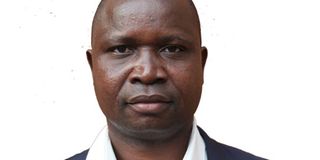Prime
Why Parliament has set bar high for journalists

The Director, Communication and Public Affairs - Parliament of Uganda, Mr Chris Obore.
Other than knowing the problem, there appears to be little action from the media industry to address the problem. Instead, they are quick to condemn the options that others come up with. So, Parliament has opted for a degree, instead of condemning; what is your practical solution to the problem of low quality?
Parliament last week sent out a letter to editors requesting them to send names of their journalists they would want to deploy to cover the 10th Parliament.
The letter was sent out early because we intend to procure training in parliamentary procedure and practice for the accredited journalists before the start of the next Parliament. This training is in line with Parliament’s interest in enabling the media do their work better. Because of the complexity and intense nature of Parliament, we asked editors to send us their best reporters preferably those with any degrees and three years in journalism practice.
The Press and Journalists Act of 1995 says: “A person shall be eligible for full membership of the institute (NIJU) if— (a) he or she is a holder of a university degree in journalism or mass communication; or (b) he or she is a holder of a university degree plus a qualification in journalism or mass communication, and has practised journalism for at least one year.”
As an institution that passed the law, Parliament should be the first to respect it. Parliament would have demanded only full members of National Institute of Journalists of Uganda (NIJU) are accredited but we are open to any degree with a bit of experience in practicing journalism. Our democracy is not yet developed, therefore, shaping it places a big burden on all actors but it puts more challenge on the Fourth Estate to have a fair, balanced and accurate record of events in addition to intense interrogation of actors and issues.
However, the reaction from some actors to our demand is unfortunate. Some argue the requirements infringe on the rights of journalists to cover Parliament. That is false. It’s one thing to have a right but there are requirements that qualify you to exercise that right. For instance, everybody has a right to work but a carpenter should not be employed as a pharmacist because they have a right to work or a plumber employed as a surgeon. You cannot also employ an engineer as a medical doctor just because they are all scientists.
Some argue that most MPs are uneducated (or less educated) because their minimum requirement is A’ level or its equivalent, therefore; there is no need for journalists who cover them to be better educated. This is dishonest analysis. It is like saying lawyers representing uneducated (or less educated) Ugandans in court should not have degrees and certificates from Law Development Centre.
It’s true a degree does not always infer common sense and intellect but that does not mean university training is of no value. Let’s not drop journalism standards just because those you are going to cover “are not educated”. In any case, do journalists who report in Parliament serve MPs or the wider public? If the MPs “are not educated” as you want the world to believe, don’t your readers, viewers and listeners deserve insightful reports from Parliament? Our main interest is to improve the quality of public engagement with the legislature.
The story of MPs having low academic qualifications also exposes lack of depth in some journalists who report from Parliament and actually justifies our demand for degree holders to report about Parliament. On October 12, 2014, Mr Sadab Kitatta Kaaya of The Observer did some good journalism. He did an analysis of MPs’ academic qualifications and found out that out of 375 legislators excluding ex-officios, 175 MPs hold bachelor’s degrees, 139 hold Masters Degrees, 8 hold PhDs, and 25 hold diplomas while only 10 have A’ level. So, majority MPs are people who have interacted with the blackboard for many years. They have also worked in important sectors before joining Parliament.
It is unfortunate that journalists only talk about self-regulation without demonstrating seriousness about it. In fact, even traditional healers are better organised than Ugandan journalists. Why then do journalists demand higher standards from others yet they appear to cherish and preserve low standards in their own industry?
As Parliament, we deemed it necessary to associate with journalists who meet certain minimum requirements; in this case a degree. Instead of engaging with us to see what works best for us all, some journalists choose confrontation. As an arm of government, Parliament has rules that guard its independence and operations. As a public institution, journalists are accredited to cover proceedings of the House without diminishing the authority, honour and dignity of Parliament.
The problem of quality of our journalism is well known and well-articulated by many senior journalists and other eminent people. However, other than knowing the problem, there appears to be little action from the media industry to address the problem. Instead, they are quick to condemn the options that others come up with. So, Parliament has opted for a degree, instead of condemning; what is your practical solution to the problem of low quality?
As Parliament, we are open to listening without giving away the right and privileges of the House. Someone always has to make a decision.
Mr Obore is the Director, Communication and Public Affairs - Parliament of Uganda. [email protected]




